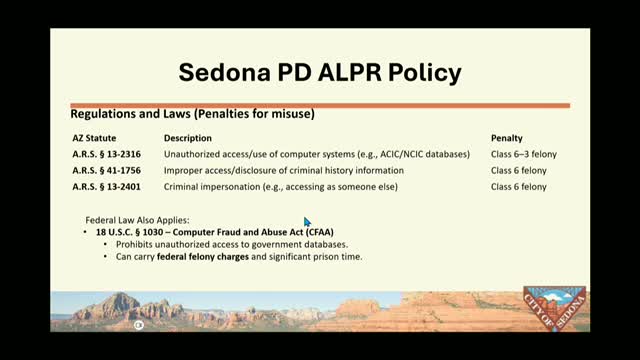Sedona Council Reviews Regulations on License Plate Reader Data Usage and Privacy Protections
August 13, 2025 | Sedona, Yavapai County, Arizona
Thanks to Scribe from Workplace AI , all articles about Arizona are free for you to enjoy throughout 2025!

This article was created by AI using a video recording of the meeting. It summarizes the key points discussed, but for full details and context, please refer to the video of the full meeting. Link to Full Meeting
The council reviewed various Arizona Revised Statutes (ARS) related to unauthorized access and misuse of computer systems, noting that violations can lead to serious penalties, including felony charges. The discussions underscored that both state and federal laws impose strict regulations on the use of ALPR data, ensuring that only authorized personnel can access sensitive information. This is crucial for maintaining public trust and safeguarding individual privacy.
Trevor Chandler, the director of public affairs for Flock, the company providing the ALPR technology, addressed concerns about data ownership and privacy. He reassured the council that Sedona retains ownership of all data collected, and Flock does not sell or share this information with third parties. Chandler emphasized that the system is designed to enhance public safety while adhering to strict data retention policies, with a standard retention period of 30 days.
The council also discussed the auditing process for ALPR usage, which includes quarterly reviews to ensure compliance with established policies. Any misuse detected during these audits could lead to disciplinary actions, including termination or criminal prosecution. This commitment to accountability is intended to reassure the community that the technology will be used responsibly.
Community concerns regarding privacy were acknowledged, with Chandler noting that the ALPR system is not a mass surveillance tool but rather a focused investigative asset. He referenced legal precedents affirming that individuals do not have a reasonable expectation of privacy while traveling on public roadways, which supports the use of such technology in law enforcement.
In conclusion, the Sedona City Council's discussions on ALPR technology reflect a proactive approach to balancing public safety with privacy concerns. The council's commitment to transparency and accountability in the use of this technology is expected to foster community trust as they move forward with its implementation. Future meetings will likely continue to address these critical issues as the city navigates the complexities of modern law enforcement tools.
Converted from Sedona - City Council meeting on August 13, 2025
Link to Full Meeting
Comments
View full meeting
This article is based on a recent meeting—watch the full video and explore the complete transcript for deeper insights into the discussion.
View full meeting
